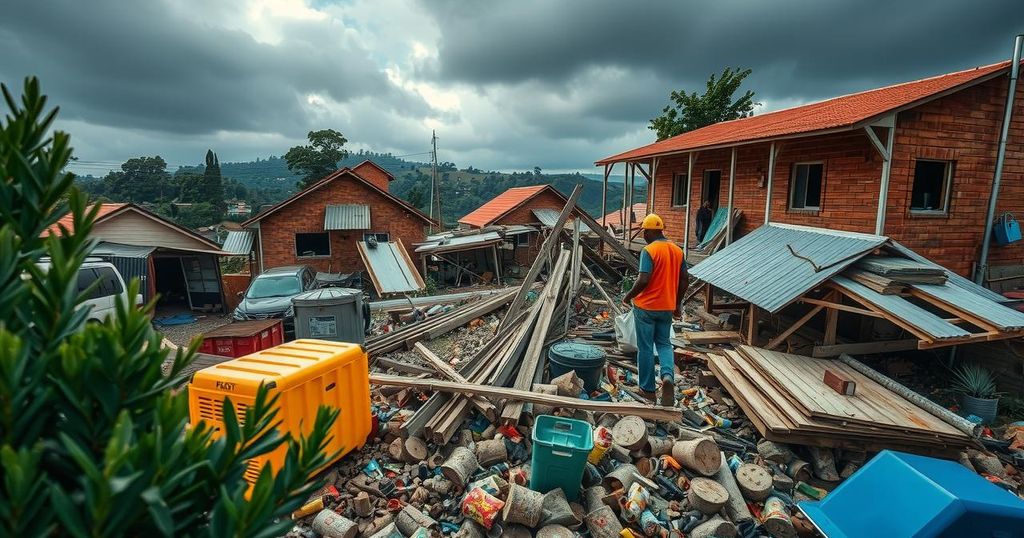Zimbabwe’s Recovery Journey After Cyclone Idai: Mwaedza’s Inspiring Story

CARE International has supported over 300,000 people affected by Cyclone Idai in Zimbabwe. The cyclone caused widespread devastation, leading to significant loss of life and necessitating extensive recovery efforts. Mwaedza, a survivor, recounts her struggles and the relief brought by CARE’s housing project, which restored her sense of hope. The initiative emphasizes the importance of disaster preparedness, while highlighting ongoing challenges faced by others in similar situations.
CARE International has made significant strides in aiding over 300,000 individuals impacted by Cyclone Idai, which ravaged eastern Zimbabwe in March 2019. The cyclone caused catastrophic damage, resulting in over 340 fatalities and displacing nearly 60,000 people, with an estimated $622 million in direct damages and necessitating a recovery budget of $1.1 billion. Among the survivors is Mwaedza, a 65-year-old woman who lost her home and livelihood to the storm, enduring hardship before finding solace through CARE’s shelter initiative.
Mwaedza was forced to flee her devastated village in Chipinge district and seek refuge at her ancestral home. Despite the challenges of displacement, she persevered, constructing a makeshift home under dire conditions. However, with CARE’s assistance, Mwaedza received help in building a new home, which not only offered her family safety but also restored her hope for a better future. As she notes, “I am overjoyed by this new home. Now, for the first time in years, my son can sleep indoors. The relief I feel is indescribable.”
The Strengthen Shelter Preparedness and Response pilot project, funded by the Volant Charitable Trust, was designed to bolster shelter preparedness in disaster-prone areas like Manicaland province. Through collaboration with the Zimbabwean government and community participation, CARE developed housing prototypes to provide quick and effective shelter in emergencies. Mwaedza’s story exemplifies resilience and hope; despite past adversities, she is now able to envision a future free from the constant fear of storms.
Reflecting on her transformation, Mwaedza expressed renewed confidence in her circumstances, stating, “This house is more than just a shelter. It’s a symbol of hope, a sign that we can overcome anything with the right support.” While she enjoys this newfound stability, the threat of climate-related disasters continues to loom over many vulnerable families in Zimbabwe. Walter Mwasaa, CARE Zimbabwe Interim Country Director, emphasized that, “To ensure that more families like Mwaedza’s can rebuild their lives from a solid base, more action and funding is required.”
Ultimately, Mwaedza’s narrative of survival serves as an inspiring testament to the human spirit’s resilience amidst natural calamities. With her new home, she is prepared to confront future challenges, realizing that hope can flourish even in the aftermath of disaster.
The aftermath of Cyclone Idai in March 2019 devastated eastern Zimbabwe, inflicting heavy losses on its population and infrastructure. CARE International has actively engaged in recovery efforts, assisting those affected by providing essential needs such as food, water, education, and shelter. The cyclone’s impact not only highlighted the immediate need for humanitarian aid but also pointed to a larger issue regarding disaster preparedness and housing resilience in regions susceptible to extreme weather events, which is particularly critical in the context of climate change.
Mwaedza’s journey highlights the critical importance of resilience and support structures in disaster recovery. Through CARE International’s intervention, her transformation from a state of despair to renewed hope underscores the vital role that community and organizational support play in rebuilding lives. As efforts continue to enhance disaster preparedness and secure stable housing, the stories of individuals like Mwaedza inspire a collective response to ensure safety and resilience across vulnerable populations in Zimbabwe.
Original Source: www.care.org








